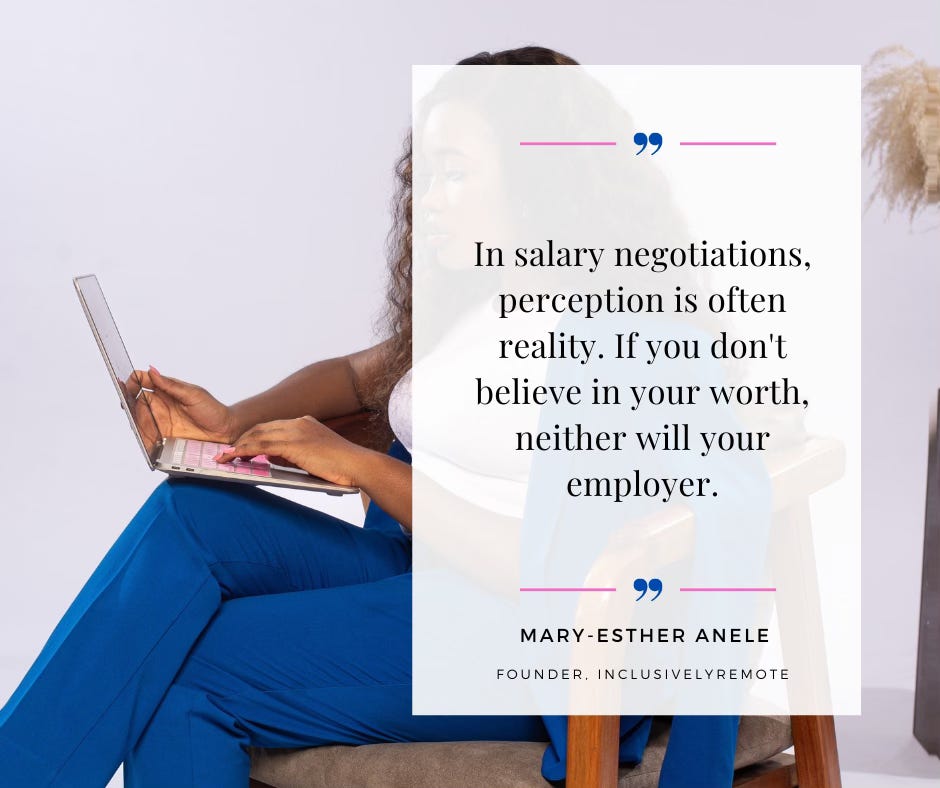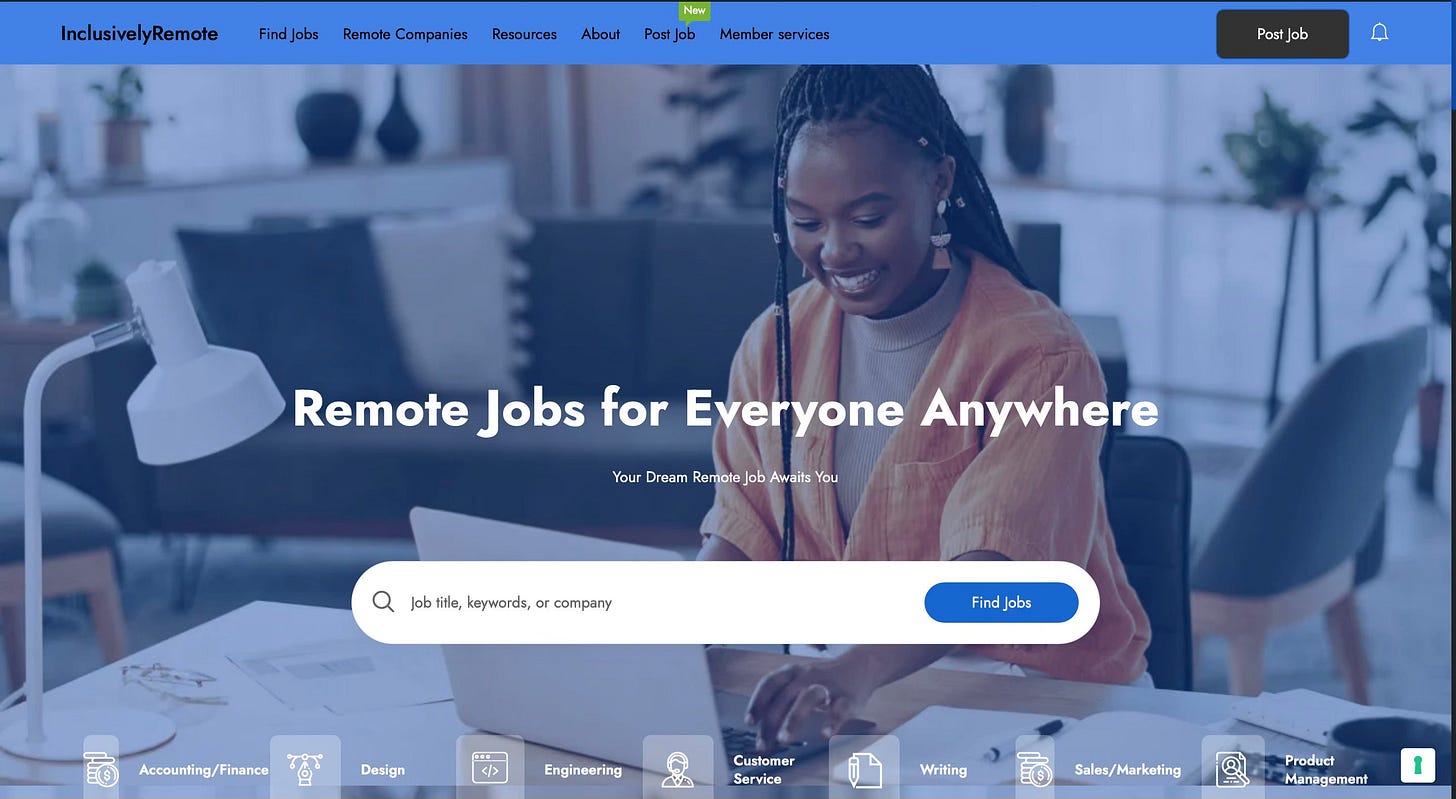You Don't Get What You Deserve, You Get What You Negotiate
Best Tips to Know When Negotiating Your Salary for a Remote job
Hi Superstar,
Do you get slightly annoyed when you hear the phrase "Heaven helps those who help themselves"
Yes, it can be frustrating, especially when you feel let down by someone who should have fulfilled their responsibilities. This sentiment mirrors the corporate world and particularly resonates when it comes to negotiating salaries. Despite its irritating tone, sadly, its the truth. If you're disinterested about securing your worth, you'll likely end up being paid peanuts and far less than you deserve.
The key to earning what you deserve is through effective negotiation. So, if you're aiming for that dream job with a salary that reflects your true value, here's a deeper dive into some steps that can help you master the art of negotiation:
1. Do Your Homework
Before stepping into any negotiation, research is paramount. Understand the industry standards, the average salary for the role you're applying for, and the financial health of the company. Use resources like Glassdoor, Payscale, and industry reports to gather data. Knowledge is power, and coming armed with facts and figures can give you the leverage you need to argue your case convincingly.
2. Know Your Value
Reflect on your skills, experiences, and achievements. Create a detailed list of your accomplishments and how they have added value in your previous roles. Quantify your successes where possible – whether it’s revenue generated, costs saved, or projects successfully completed. This will not only boost your confidence but also provide concrete evidence of your worth to your potential employer.
3. Practice Your Pitch
Negotiation is as much about how you say it as what you say. Practice your pitch with a friend or mentor. Focus on clarity, confidence, and positivity. Avoid sounding confrontational; instead, frame your requests in a way that emphasizes mutual benefit. For example, "I am confident that my experience in XYZ can bring significant value to your team, and I believe a salary of $X would reflect the level of contribution I am prepared to make."
4. Timing Is Crucial
Timing can significantly impact the success of your negotiation. The best moment to discuss salary is often after you've been offered the job but before you've formally accepted it. At this stage, the employer has decided they want you, giving you more negotiating power. If possible, try to avoid discussing salary until the final stages of the hiring process.
5. Be Prepared to Walk Away
One of the most powerful tools in negotiation is the willingness to walk away. If the offer doesn’t meet your minimum expectations or the company cannot match your worth, it’s important to stand firm and explore other opportunities. This demonstrates your confidence and often can lead to the employer reconsidering their offer.
6. Ask Questions
Engage the employer in a conversation about the salary offer. Ask how they arrived at the figure, what the scope for growth is, and how your role can evolve. This not only shows your interest in the long-term prospects but also provides additional information that could justify a higher salary.
7. Never Underestimate Non-Monetary Benefits
Sometimes, companies might have a fixed budget for salaries but can offer other valuable perks such as additional vacation days, flexible working hours, professional development opportunities, or stock options. Be open to these discussions and consider the overall compensation package rather than focusing solely on the base salary.
8. Keep Emotions in Check
Negotiations can sometimes become intense, but it’s crucial to remain calm and professional. Emotional reactions can undermine your position. Stick to the facts, remain polite, and focus on achieving a win-win outcome.
9. Seal the Deal in Writing
Once you’ve reached an agreement, ensure that all the terms are documented in writing. This avoids any misunderstandings or discrepancies later on and provides a clear reference for both parties.
10. The "What-If" Strategy
Introduce a hypothetical scenario to probe the employer's flexibility. For example, you could say, "What if I were to accept this role for the salary offered but with a performance review and potential salary adjustment after six months?" This shows your willingness to prove your value while also setting the stage for future negotiations. It can also provide insight into the company's willingness to reward performance.
The Difference Between Inclusivelyremote’s Job Board Free and Premium Viewing Version
At InclusivelyRemote, our mission is to connect talented individuals with inclusive remote job opportunities. While our free model offers valuable access to job listings on the homepage, upgrading to our premium subscription with just $1.49/ N2,000 monthly unlocks a comprehensive suite of features designed to supercharge your job search and increase your chances of landing your dream job. Here’s a detailed look at how our premium model can benefit you:
1. Expanded Job Page Access: Premium users enjoy access to a specialized job page featuring a variety of global, paid, inclusive remote opportunities from renowned remote-friendly companies. This exclusive access ensures that you can explore a wider range of job listings tailored to your career goals and comfortably use the job tags and filter to significantly enhance your job search.
2. Customized Job Alerts: Stay ahead in your job hunt with customized job alerts. Premium users can set up job alerts based on their preferences and receive notifications every Friday evening. Additionally, daily alerts are sent to your email every morning at 8 AM, ensuring you are among the first to know about new opportunities. This proactive approach helps you stay updated and gives you a competitive edge.
3. Bookmarking Functionality: Our bookmarking functionality allows premium users to save job postings for later. This means you can keep track of interesting opportunities and apply at your convenience, ensuring you never miss out on potential jobs that align with your career aspirations.
4. Community Support: Joining our premium tier grants you access to a private community where you can benefit from job application assistance, discover unadvertised remote openings, receive job referrals, and engage in networking opportunities. This supportive community provides invaluable resources and connections, helping you navigate the remote job market with ease.
5. Confidence in Your Job Search: Premium users have access to advanced tools and features that make navigating the remote job market easier and more efficient. With the resources provided, you can approach your job search with confidence, knowing you have the support to propel you toward your career goals.
6. Monthly Career and Onboarding Resources: To further enhance your job search, we provide premium users with monthly career and onboarding resources. These include resume templates, interview answer guides, cold email templates, and other valuable materials designed to upskill you and improve your chances of landing your desired role. These resources ensure you are well-prepared and stand out in the competitive job market.
Why Upgrade?
Upgrading to premium on Inclusively Remote is an investment in your career. It provides you with the tools, support, and exclusive opportunities to enhance your job search experience and significantly increase your chances of success. Whether you are looking to kickstart your remote career or advance in your current field, our premium features are designed to help you achieve your career goals efficiently and confidently.
Latest Remote Jobs Offering Company Paid Retreats and Vacation
Yours truly,
Your Career Cheerleader,
Mary-Esther Anele
LinkedIn| Twitter| Instagram | TikTok | Newsletter






